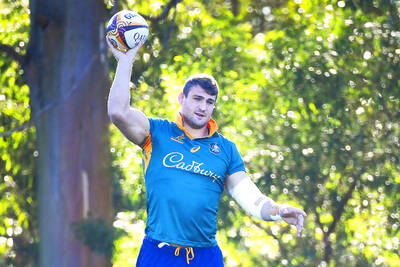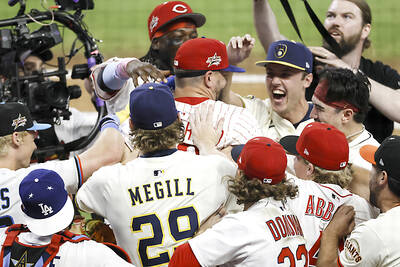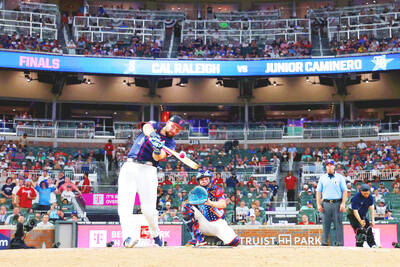On a street lined with Victorian houses in the Astor Park section of Green Bay, Wisconsin, James Schmitt, the mayor of the city, and his wife, Dona, gathered their three daughters, Anna, Greta and Laura, and plopped in front of the television on Monday night.
The girls wore Packers gear and drank hot chocolate and watched the quarterback who, Schmitt says, is their "second favorite guy" behind dear old dad.
When they weren't cheering for Brett Favre, the family talked about life and death. But they mostly just watched television, watched Favre lead Green Bay to a 41-7 victory over the Oakland Raiders, one day after Favre's father, Irvin, 58, died of a heart attack while driving near Favre's hometown, Kiln, Mississippi.
"Everyone in this community is sensitive to family," Schmitt said in a telephone interview Tuesday. "It's what we pride ourselves in. People would have respected his decision not to play, but for him to go out and perform, and then mention the love he has for his father, as the mayor of Green Bay, I was proud he was representing not only the Packers but the city."
For a quarterback with an endless bankroll of good will, Favre only added to his legend, in Green Bay and beyond its borders. Favre did not have to play. His resume, with a Super Bowl title, a record 205 consecutive starts, including the postseason, and three Most Valuable Player awards, is nearing tomelike proportions.
But with teammates in need and his wife, Deanna, in the stadium, the 34-year-old Favre pulled the country along for a three-hour thrill ride. He flicked passes as if he were dealing blackjack. He skipped around the field like a child.
By halftime, he had fantasy football devotees changing the batteries in their calculators: 311 yards passing and four touchdowns. Favre finished the game with 399 yards passing and dozens of hugs from teammates and opponents alike.
The victory, practically a sidelight to Favre's night, kept Green Bay (9-6) in the hunt for a playoff berth. If the Packers defeat Denver at Lambeau Field on Sunday, and the Vikings (9-6) lose in Arizona (3-12), they will clinch their second consecutive NFC North title. The Packers can also earn a playoff berth if Seattle (9-6) loses in San Francisco (7-8) on Saturday.
"I knew my dad would have wanted me to play," Favre said after the game. He and his wife flew from San Francisco to Mississippi on Tuesday.
Coach Mike Sherman and Favre's backup, Doug Pederson, and his wife, Jeannie, are among the Packers family who will attend Irvin Favre's funeral on Wednesday.
On Monday night, Favre's effort kept a lot of people awake, including Stephen Taylor, a clinical psychologist who works with athletes in Merrick, New York.
Taylor, in a telephone interview, said Favre's performance should be studied as an example of an elite athlete's focus and an ability to raise the level of play of those around him.
"Besides the human-interest story of Favre is the understanding of the skill sets of an elite athlete," Taylor said. "One skill set we know he has is the ability to focus and play through pain; an ability to block all things out and have the focus of a laser beam.
"That level of focus is contagious," Taylor said of the rousing play of Favre's teammates. "It's a Michael Jordan effect. One thing he used to do was make others around him better. Brett Favre did that too."
The day after a Packers game Green Bay is always abuzz, but Tuesday was especially electric, Schmitt said. People were talking about Favre as if he were their child and about what he means to their community, Schmitt said.
In the Schmitt household, Favre's decision to play also provided a point of discussion. In February 2002, a fourth child of the Schmitts died three days after she was born.
Favre's effort did more than just keep a team pushing toward the playoffs. It provided a lesson.
"Death is difficult," Schmitt said, echoing the Monday night family conversation. "We talked about knowing you can go on. We talked about Brett Favre's wife being there with him, how important that was, and that she is going to grieve with him."
In the annals of Favre's best performances, Monday night's was at or near the top. But there is at least one more game left this year, then, Favre has said, another season after this one.
Schmitt will continue to watch Favre, in wonderment as most do, with his family close by. "I'm glad he's not running for mayor," Schmitt said.

Tainan TSG Hawks slugger Steven Moya, who is leading the CPBL in home runs, has withdrawn from this weekend’s All-Star Game after the unexpected death of his wife. Moya’s wife began feeling severely unwell aboard a plane that landed at Taiwan Taoyuan International Airport on Friday evening. She was rushed to a hospital, but passed away, the Hawks said in a statement yesterday. The franchise is assisting Moya with funeral arrangements and hopes fans who were looking forward to seeing him at the All-Star Game can understand his decision to withdraw. According to Landseed Medical Clinic, whose staff attempted to save Moya’s wife,

Wallabies coach Joe Schmidt yesterday backed Nick Champion de Crespigny to be the team’s “roving scavenger” after handing him a shock debut in the opening Test against the British and Irish Lions Test in Brisbane. Hard man Champion de Crespigny, who spent three seasons at French side Castres before moving to the Western Force this year, is to get his chance tomorrow with first-choice blindside flanker Rob Valetini not fully fit. His elevation is an eye-opener, preferred to Tom Hooper, but Schmidt said he had no doubt about his abilities. “I keep an eye on the Top 14 having coached there many years

ON A KNEE: In the MLB’s equivalent of soccer’s penalty-kicks shoot-out, the game was decided by three batters from each side taking three swings each off coaches Kyle Schwarber was nervous. He had played in Game 7 of the MLB World Series and homered for the US in the World Baseball Classic (WBC), but he had never walked up to the plate in an All-Star Game swing-off. No one had. “That’s kind of like the baseball version of a shoot-out,” Schwarber said after homering on all three of his swings, going down to his left knee on the final one, to overcome a two-homer deficit. That held up when Jonathan Aranda fell short on the American League’s final three swings, giving the National League a 4-3 swing-off win after

Seattle’s Cal Raleigh defeated Tampa Bay’s Junior Caminero 18-15 in Monday’s final to become the first catcher to win the Major League Baseball Home Run Derby. The 28-year-old switch-hitter, who leads MLB with 38 homers this season, won US$1 million by capturing the special event for sluggers at Atlanta’s Truist Park ahead of yesterday’s MLB All-Star Game. “It means the world,” Raleigh said. “I could have hit zero home runs and had just as much fun. I just can’t believe I won. It’s unbelievable.” Raleigh, who advanced from the first round by less than 25mm on a longest homer tiebreaker, had his father